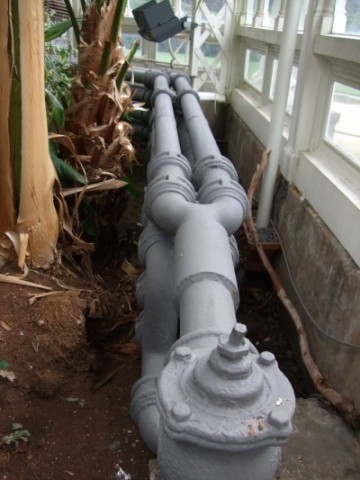Liverpool has retained a rich cultural and building heritage and with over 2,500 listed buildings, it is one of Britain’s finest Victorian cities. In 2004 its mercantile, maritime core was accorded World Heritage Site status.
Completed in 1896, Sefton Park Palm House was a gift to the City by Henry Yates Thompson. It was designed by an Edinburgh firm, MacKenzie & Moncur who had branches in Glasgow and London and an extensive portfolio of glasshouse across the country. Sefton Park Palm House was designed in the tradition of Paxton's glass houses and was stocked originally with a rich collection of exotic plants. There were 9 marble statues on display inside together with a marble bench.
Grade 2 listed buildings such as The Palm House status are considered to be of special architectural, historical or cultural significance, which are protected from being demolished, extended or altered, unless special permission is granted by the relevant planning authorities. Since the £3.5m restoration re-opening in September 2001, Sefton Park Palm House has become well established as a popular visitor attraction with over 100,000 visitors each year enjoying the heritage. It is also a prestigious location for private parties and celebrations with over 50 weddings being conducted here each year.
The space heating system, much of which, derives from its original construction in 1896 is also covered by the Grade 2 status and is an 8 pipe cast iron flow and return system ( 4 + 4 ) and as such any repairs must be undertaken with due regard to its protected status. The original pipe joints were male and female caulked spigots sealed with packing and then capped with a circular collar.
These are not readily available now in 6inch cast iron and herein lies the challenge, as when some initial attempts to cure a leak resulted in inadequate pipe support and possible further deterioration by sagging,Steven Thomson, MD of Gordon Alison was consulted and invited to undertake the repairs. Any repairs are carefully monitored by English Heritage who have approval and veto powers to ensure the aesthetics of the heating system remain as closely true to the original as possible.
In the event and after considerable design input, Steven’s company sourced new cast sections for 1 quadrant and fitted these successfully. English Heritage and Liverpool City Council are very pleased with the outcome as this repair met all the conservation requirements as specified in the project.
System volume is 5m3 and the water is heated by 2 Remeha P200 boilers located in an annex building with an underground pipe culvert linking both buildings. These are 3 pass sectional boilers and as the water chemistry in Liverpool is corrosive if untreated, Sentinel X100 Inhibitor has been selected to maintain system integrity and water side protection.
In addition, Sentinel X400 System Restorer has been provided to ensure a pre-commission clean can be undertaken to prepare the metal surfaces for corrosion inhibition. Sentinel water treatment products are the preferred selection by Liverpool City Council with X100 and others from the X range in current use in many of the properties, as managed by Dave Jones who leads the Council Building Services Team.
.jpg)

Sentinel is a company with a clear goal: we offer water treatment products and services that provide the best lifetime protection for heating and hot water systems. Originally launched in the UK by Grace Dearborn in 1988 and subsequently a subsidiary of the leading multinational General Electric, Sentinel has operated independently since 2005, expanding its international reach and range of innovative solutions. As of 2021, Sentinel is owned by Aalberts N.V., and sits in the hydronic flow control cluster.
